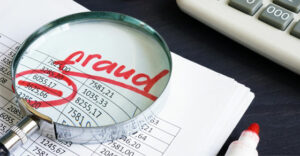
A business is a complex arrangement of liabilities and assets.
This makes determining the value of a business much more complicated than determining the value of a physical asset like a house or a car—business valuation must take into account both the risk and potential returns associated with the company.
One such risk is fraud.
Valuation experts are always on the lookout for fraud, even if a valuation isn’t specifically designed to uncover this type of activity. If an expert encounters suspicious behavior, they may expand the scope of their engagement with a company.
Read on to learn more about how valuators assess fraud risk.
Assessing fraud risk
Assessing fraud risk starts with an evaluation of a company’s internal controls, which are the systems that a company puts in place to prevent both unintentional errors and dishonest behavior.
These risk-reducing controls may include
- Physical and digital controls (for example, locks, passwords, cameras and security systems),
- Fraud training programs,
- Job descriptions that call for segregation of duties and job rotation,
- Mandatory vacation policies,
- Background checks, and
- Whistleblower hotlines.
A valuation expert will also look for factors that increase risk, such as management overrides of internal controls or a lack of regular audits from an external auditor.
Valuation experts may also pay special attention to industries that tend to be more susceptible to fraud (such as banking and financial services, government and public administration, and manufacturing), and to valuation engagements that can provide a motive to hide assets (like shareholder disputes or divorces).
Valuation and forensic accounting
If a valuation expert suspects fraud based on their evaluation of a company’s financial statements, the valuation may require the expertise of a forensic accountant.
Some valuators are trained as forensic accountants or work in large firms that provide both valuation and forensic accounting services. These vaulators may ask a client to expand the scope of their engagement. Sole practitioners will instead refer a client out to a forensic accountant.
In either case, a forensic accountant can make the adjustments necessary to produce an accurate valuation. A forensic accountant can also help build a fraud case and estimate economic damages resulting from fraudulent activity.
Fraud risk and your business
Fraud can strike any business. Contact a trusted Smolin advisor for help evaluating and managing your fraud risk, as well as for advice on how to obtain an accurate valuation for your business.
